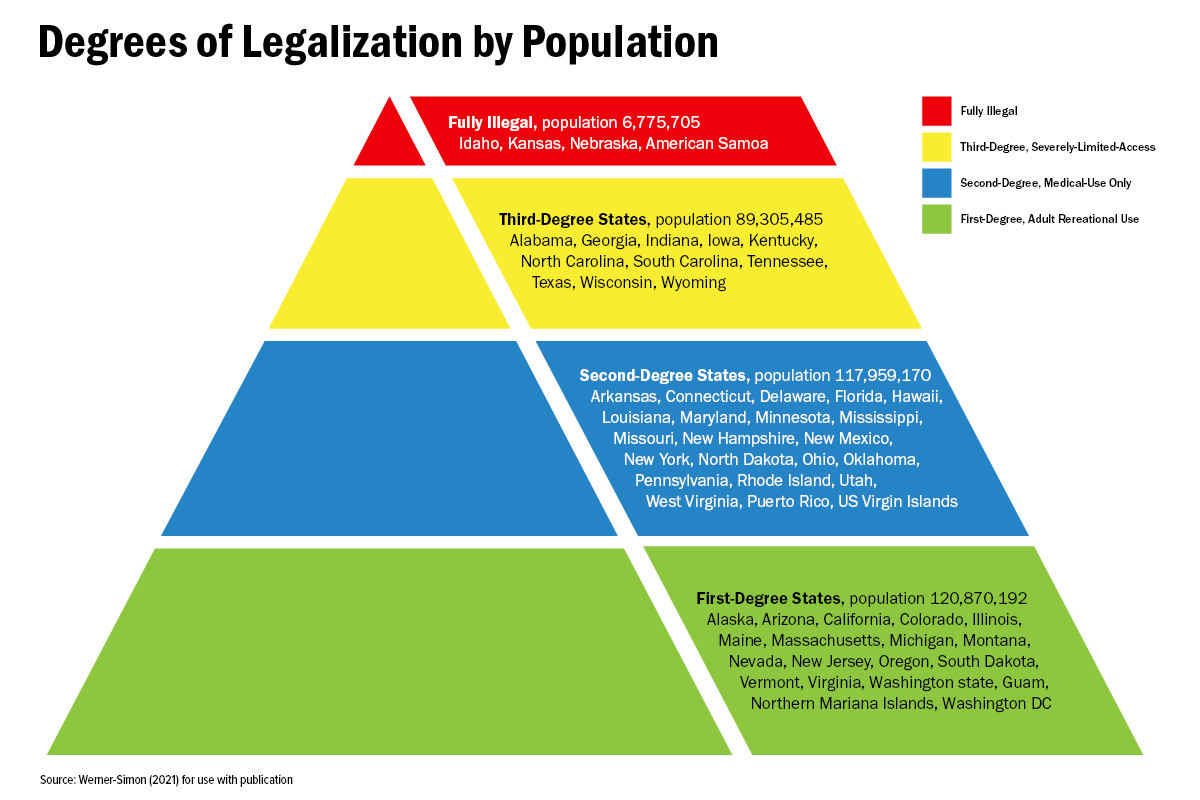Adult-use cannabis legalization in New York will produce powerful impacts well beyond the sales generated within the state’s borders, industry experts say.
Lawmakers passed the measure late Tuesday night, and Gov. Andrew Cuomo quickly signed the bill into law the next morning.
Sales are expected to start within 12 to 18 months. Marijuana Business Daily projects that sales will reach $2.3 billion a year by the program’s fourth year and nearly $2.5 billion by Year 5.
While some impacts to the larger marijuana industry are still to be determined, here are a few potential ones to keep in mind:
- Increased investor interest in U.S. cannabis companies from private equity firms, mutual funds and other Wall Street institutions.
-
A boost to federal marijuana reform efforts, especially cannabis banking.
- An acceleration of the legalization ripple effect along the East Coast.
- A potential template for social and economic equity programs in other states.
- A creative influence in the marijuana industry in terms of products, brands and packaging.
“The legalization of recreational use in New York State, and in particular New York City, provides a heightened level of visibility to Wall Street (and Madison Avenue) which could ultimately lead to a surge in invested capital,” GreenWave Advisors founder Matt Karnes told Marijuana Business Daily via email.
Lisa Tollner, co-founder and CEO of California-based Sensi Products, said to look at the biggest market on the West Coast for an idea of how New York’s legalization will affect the industry.
”Taking from lessons learned in California,” she said, “there will be billions of dollars of tax revenue generated for the state of New York, and, as a financial hub, this will have wide-ranging positive impacts.”
David Mangone, director of policy for The Liaison Group, a Washington DC firm that lobbies for the National Cannabis Roundtable, wrote that New York’s success could help propel comprehensive marijuana reform that’s being embraced by Senate Majority Leader Chuck Schumer, a New York Democrat.
“Additionally, with New York City being the world’s leading financial center, legalization may bring a new wave of interest from investors and banks to push for regulatory reforms like SAFE Banking,” Mangone noted.
The Secure And Fair Enforcement (SAFE) Banking Act would enable financial institutions to serve marijuana businesses without fear of federal prosecution.
Nathaniel Gurien, CEO of New York-based Fincann, which provides cannabis banking services, had a similar take.
“New York … as the financial capital of the world would put pressure on legislators to push for the passage of the SAFE Banking Act and, more importantly, federal legalization,” Gurien wrote in an email to MJBizDaily.
Domino effect
For the past several months, industry experts have talked about the domino effect that would occur after voters in New Jersey approved adult-use legalization at the ballot box last November.
New Jersey lawmakers and Gov. Phil Murphy agreed on an implementation law in February, setting the stage for a $1 billion market.
New York now steps into the spotlight.
“It’s only going to continue the domino, the ripple effect down the East Coast,” said Rob DiPisa, a cannabis attorney for New Jersey-based Cole Schotz.
Noah Fishman, co-owner and founder of Zenbarn Farms, a CBD cultivator and brand located in Vermont, believes New York’s legalization “could ignite the cannabis industry’s growth for all of New England and push all neighboring states to get serious about cannabis.”
Vermont legalized recreational marijuana in 2020, and Maine and Massachusetts have active recreational markets.
But Connecticut, New Hampshire and Rhode Island have yet to legalize adult use, although the governors of Connecticut and Rhode Island are pushing for it.
Social equity template?
New York’s adult-use measure tries to address concerns about large operators taking over the marijuana industry.
The state currently has only 10 medical marijuana operators, and nine are large, multistate companies. There’s only one homegrown cannabis company, Katonah-based Etain Health.
The stated goal of the new law is to award 50% of all adult-use licenses to social and economic equity applicants. Support to social equity applicants will include low- or no-interest loans and programs such as mentoring.
— Crystal D. Peoples-Stokes (@CPeoplesStokes) March 28, 2021
Microbusinesses would be allowed to form vertical operations that cultivate, process and sell cannabis products.
“The idea is to give them the greatest possibility to succeed within the market that’s going to be created in New York,” said Steve Hawkins, executive director of the Marijuana Policy Project in Washington DC.
“It could be, at the end of the day, one of the strongest equity measures we’ve seen.”
DiPisa agreed: “I think New York has really set a new bar when it comes to the social equity programs that they are proposing.”
For example, DiPisa said, allowing microbusinesses to be vertically integrated will help them compete with the economies of scale enjoyed by a larger operator.
He said he already is fielding inquiries from potential social equity and small-business applicants.
Still, Charles Gormally, co-chair of cannabis law at Brach Eichler in New Jersey, expressed concerns that potentially high entry barriers could lead to “sophisticated multistate operators who will dominate the new industry in New York.”
New York-based Viridian Capital Advisors wrote in a research note published Wednesday that existing MMJ operators will maintain long-term advantages, “creating an unequal playing field for new entrants.”
Under the new law, existing MMJ operators can double their number of dispensaries from four to eight, as long as two are in unserved or underserved areas. They also will be allowed to each open three adult-use stores.
“All new entrants to the market will be capped at three total stores,” Viridian noted.
“Medical only dispensaries in rec markets can still be solid revenue generators and these additional stores could be sold off.
“Additionally, the existing license holders can remain vertically integrated and are permitted to expand cultivation and production capacity. Vertical integration for new operators (except for microbusinesses) is prohibited.”
Market influencer?
Industry officials also expect that New York will influence trends in the marijuana sector.
“New York has always been a progressive and cultural leader,” noted James Eichner, co-founder of Colorado-based Sana Packaging, a sustainable cannabis packaging brand.
Eichner stated that he hopes companies and consumers push to implement sustainable packaging and supply-chain practices with a low environmental impact.
“I’ll be excited to see the birth of East Coast brands coming out of the city,” said DiPisa, the cannabis attorney.
“If you look at the way New York has influenced every industry, it’s hard to think New York won’t have the same kind of influence over the cannabis industry.”
Jeff Smith can be reached at jeff.smith@mjbizdaily.com.







